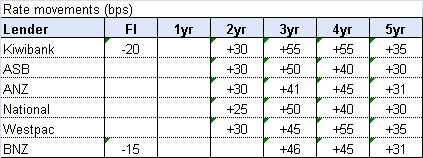Kiwibank laying down the gauntlet
Kiwibank has challenged its banking peers in the short term lending market and dropped its floating rate 20 basis points to 5.79%.
Thursday, August 13th 2009, 2:30PM  2 Comments
2 Comments
It isn't the only lender to do this, BNZ has dropped the floating rate on one of its products, Total Money, and Napier Building Society has also made a reduction with this term.
Kiwibank acting chief executive Paul Brock says recent comments by the Reserve Bank governor Alan Bollard that the Official Cash Rate (OCR) is likely to stay at its current level or lower for some time gave it confidence to again cut rates.
"The wholesale markets and deposit rates being offered by banks clearly indicate that in the longer term, rates will rise. But for now we see the opportunity to pass through additional savings on variable rates for our customers.
The moves are a challenge to the other banks and will no doubt look attractive to borrowers as the majority appear to be using shorter-term rates for their home loans.
The real trend in the past week has been that medium and long-term rates have risen significantly with some increases in the 40 to 50 basis point range. Click here to view our latest graph.
Why are these rates rising?
Two reasons are behind these increases. The main one is that swap rates have been gradually drifting upwards as confidence strengths that major offshore economies, such as the United States, are now entering a recovery phase.
Also the overall funding costs of bank loan books is changing. Long-term money was cheap but has become considerably more expensive as banks replace some of that funding at higher costs.
Meanwhile, short-term money has become more attractively priced. The two factors together impact on a lender's loan book and tend to make the over financing costs of the book more expensive.

| « NZF moves from LMI to LEM | BNZ scraps mobile mortgage managers » |
Special Offers
Comments from our readers
Commenting is closed
| Printable version | Email to a friend |




My point is I expect a second nasty dip, a double dip recession with the second one worse than the first....so the big Q is when.....So I think indeed 3~4~5 year rates are way too high....OCR stays at <1%....it might well start to blip up, but not for long....so 8% fixing for < 2 years seems excessive...IMHO...